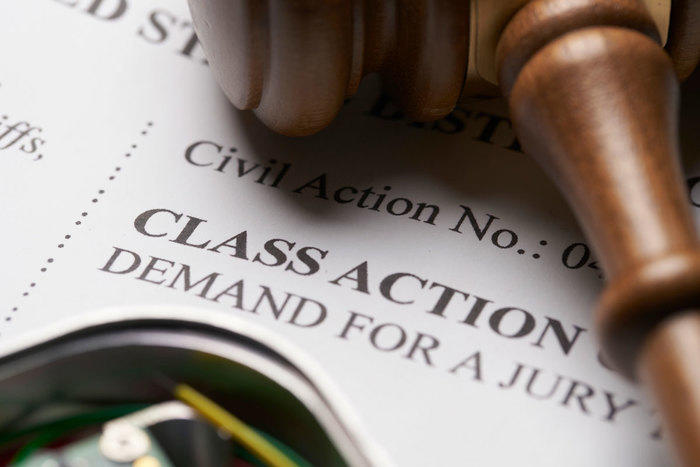BioVie Class Action Lawsuit Unveiled: Your Legal Resource
Wiki Article
Demystifying Course Activity Suits: A Closer Take A Look At Lawful Procedures
Class activity claims can be complicated and intimidating, commonly shrouded in a shroud of secret for those not familiar with the lawful proceedings included. However, gaining a deeper understanding of these suits is crucial, as they serve as an effective device for individuals to look for justice and hold companies responsible. In this discussion, we will certainly demystify class activity suits, taking a more detailed take a look at the numerous aspects of the lawful proceedings. From comprehending the criteria for class activity eligibility to the function of course representatives, and from the procedure of class qualification to the resolution of these suits, we will certainly unravel the ins and outs and clarified the inner operations of this legal system. Let's dive right into the world of class action claims and uncover the intricacies that lie underneath the surface area.Understanding Course Activity Lawsuits
Comprehending Class Action Suit needs a detailed assessment of the lawful procedures associated with cumulative litigation. Class action lawsuits are a type of lawsuit where a team of people with similar insurance claims or grievances join with each other to launch a legal action versus a typical accused. This form of litigation permits people with restricted resources to jointly look for justice, as it incorporates the toughness of several private claims right into a solitary lawsuit.The procedure begins with the identification of a lead complainant or course agent who submits the preliminary grievance in behalf of the whole class. The court then determines whether the instance satisfies the requirements for course qualification, that include commonality, numerosity, typicality, and competence of representation. If certified, the court informs prospective course members, giving them a possibility to opt-out if they want to seek their insurance claims individually.
As soon as the class is licensed, the lawsuits continues via different phases, including exploration, movement practice, and, if needed, test. The result of the suit can cause a judgment or a negotiation, which is binding on all class participants unless they choose to opt-out. Course action claims can encompass a large range of legal problems, such as customer protection, safety and securities fraudulence, employment discrimination, and environmental injury.
Understanding the subtleties of course action legal actions is vital for both plaintiffs and accuseds included in collective litigation. It requires a thorough understanding of the legal needs for certification, the legal rights and commitments of course members, and the prospective advantages and threats related to pursuing or safeguarding against class activity cases.
Identifying Course Action Eligibility
To identify whether a lawsuit qualifies as a class action suit, certain standards must be met. These criteria are developed to make sure that the situation can appropriately stand for the interests of a large group of individuals who have experienced similar damage or have been impacted by the same problem. The essential element in determining course activity qualification is the visibility of an usual inquiry or concern that influences all possible course members.First of all, a class action suit needs numerosity, which implies there should be a considerable number of potential course participants included. This guarantees that a class action is a reliable means to settle the cases of a big group of individuals, instead than having each individual file an individual lawsuit.
Secondly, there need to be commonness among the claims of the possible class members. This suggests that there have to be a typical question of regulation or truth that is central to the case. A course action might not be suitable. if each possible class participant's insurance claim is unconnected and special to the others.

The Duty of Class Rep
Course representatives play a critical function in course activity suits by standing for the passions of the entire class. These individuals are website here selected from within the class to serve as the public face of the legal action and are in charge of choosing in support of all course members. The role of class agents entails various obligations and responsibilities throughout the lawful process.
Among the primary responsibilities of class agents is to give information and assistance to their fellow class members. They function as a factor of call and interaction in between the course participants and the lawyers representing them. This consists of maintaining the course participants educated around important updates, answering their questions, and attending to any kind of problems they might have.
Course agents likewise have the task to proactively take part in the lawsuits process (BioVie class action lawsuit). This involves working very closely with the attorneys to develop lawful approaches, collecting proof, and supplying statement if necessary. They have to be proactively associated with all aspects of the instance to make sure that the most effective passions of the whole class are represented
Additionally, course agents are in charge of accepting settlements or various other resolutions gotten to in the lawsuit. They have to very carefully review the terms of the settlement and make a decision that remains in the best passion of the entire course. This decision-making process calls for cautious factor to consider and assessment with the course members.
The Refine of Class Qualification
The process of licensing a class in a course action claim involves a detailed examination of specific criteria to figure out if the case satisfies the essential requirements for course certification. Class qualification is an essential action in the litigation process as it identifies whether a legal action can proceed as a class activity, permitting a large group of individuals with comparable cases to be represented jointly by one or a couple of individuals.To acquire course certification, the plaintiff should show that the recommended class satisfies certain prerequisites. These requirements generally consist of numerosity, commonness, typicality, and adequacy of representation. Numerosity requires that the class is so big that joinder of all participants is not practical. Commonness necessitates that there are questions of legislation or truth common to the class members. Typicality needs that the insurance claims or defenses of the course reps are regular of those of the course. Competence of depiction makes certain that the course reps will relatively and effectively shield the passions of the course.
The court will look at these standards and the complainant's evidence to determine if the proposed course satisfies the required requirements. The court might additionally think about other factors, such as whether a course action is the premium technique to fix the dispute and whether the course is sufficiently natural.

When the court grants course qualification, the claim can proceed as a class activity, enabling the plaintiffs to collectively look for relief and potentially obtain a judgment or settlement that benefits the whole class.
Dealing With Class Action Legal Actions
When class qualification has been given, the following action in dealing with a class activity suit is read the full info here to browse the process of litigation or negotiation negotiations. Lawsuits refers to the lawful procedures in court, where the plaintiff's lawyer presents proof and disagreements to sustain their insurance claims, and the defendant's lawyer counters with their own proof and disagreements. This procedure can involve numerous stages, such as pretrial activities, discovery, and test. During pretrial activities, both celebrations might file motions to reject the case or limit the issues in contention. Discovery permits each side to gather proof and info from the other event through approaches such as file interrogatories, requests, and depositions. If the instance continues to trial, both celebrations offer their case before a court or court, that will certainly then choose the end result.On the various other hand, negotiation negotiations involve discussions in between the celebrations to reach a mutually appropriate resolution hop over to these guys without going to trial. Settlement offers might be made at any type of stage of the lawsuits procedure, and if both celebrations agree, a negotiation contract is reached.
Final Thought
To conclude, course action lawsuits play an essential role in giving justice and payment to large teams of individuals that have actually been harmed by the exact same entity. By designating and certifying a course class reps, the legal procedure ends up being more reliable and easily accessible for the plaintiffs. Resolving these suits can be a complex and lengthy process, but it is important in holding firms liable for their actions and making sure fair outcomes for all influenced parties.From recognizing the criteria for class activity eligibility to the function of course representatives, and from the process of course certification to the resolution of these claims, we will certainly unravel the intricacies and shed light on the inner workings of this legal device. The key factor in identifying course activity qualification is the visibility of a typical concern or concern that influences all potential course participants.
If each possible course participant's insurance claim is one-of-a-kind and unrelated to the others, a class action may not be proper.
Course reps play an important function in course activity legal actions by representing the interests of the entire class.As soon as class accreditation has actually been approved, the following step in dealing with a class action suit is to navigate the process of litigation or settlement arrangements.
Report this wiki page